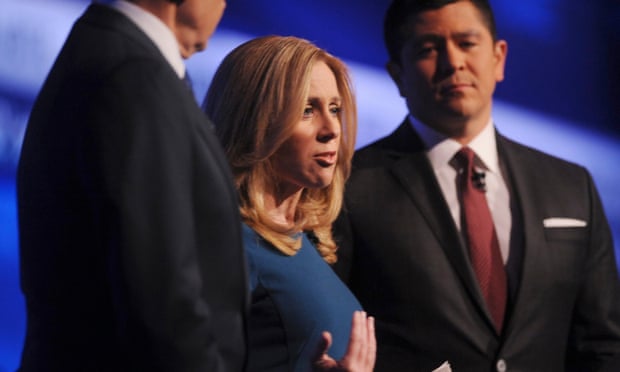As Wednesday night’s Republican presidential debate unfolded on CNBC, Democrats and progressive advocates were prepared to excoriate the Republican hopefuls for failing to back guaranteed paid family leave or equal pay for women.
They were less prepared for the moderators, in a debate focused on the economy, to be almost as silent.
“The moderators of the debate had a real blind spot in their failure to discuss equal pay, the cost of child care, the minimum wage or paid leave,” said Emily Martin, the vice-president and general counsel for the National Women’s Law Center. “These are critical pocketbook issues for millions of American families, and thus they are critical issues for the health and competitiveness of the American economy.”
A question from Becky Quick, one of the debate’s three moderators, for Texas senator Ted Cruz provided the night’s only discussion of either issue. “Working women in this country still earn just 77% of what men earn,” Quick said, noting that Cruz had called Democratic efforts to pass the Paycheck Fairness Act “political show votes”. She asked what action he supported as president.
“The Democrats’ answer to everything is more government control over wages, and more empowering trial lawyers to file lawsuits,” Cruz answered. “When you see Hillary Clinton and Bernie Sanders and all the Democrats talking about wanting to address the plight of working women, not a one of them mentioned the fact that under Barack Obama, 3.7 million women have entered poverty. Not a one of them mentioned the fact that under Barack Obama and the big government economy, the median wage for women has dropped $733.”
Carly Fiorina, the former CEO of Hewlett-Packard, jumped in to agree. “Ninety-two percent of the jobs lost during Barack Obama’s first term belonged to women,” she said. “Senator Cruz is precisely right.”
In saying so, Fiorina was repeating a popular but misleading Republican line of attack that PolitiFact labeled “mostly false”. Male-dominated industries, such as construction and manufacturing, had already shed several million jobs by the time Obama assumed office midway through the recession. Job losses shifted to the female-dominated healthcare and education industries not as a result of Obama’s policies, economists say, but historical trends governing financial crashes.
The remainder of the debate, which rambled from fantasy football regulation to attacks on the media, did not return to the gender wage gap or touch on paid leave. The silence from the moderators was surprising at a moment when the two Democratic frontrunners have made guaranteed family leave a central plank of their platforms and Clinton has hammered her support for equal pay. The Republicans sharing the stage, by contrast, have mostly avoided these topics, as the party opposes new mandates for businesses but is also struggling with its image among female voters. In September, Florida senator Marco Rubio unveiled a plan to offer a tax credit to businesses willing to give four to 12 weeks of paid leave.
“If you’re going to have a debate about the economy, you have to talk about the economic issues that people are talking about. That the other candidates are talking about. That the president has been talking about,” said Elise Gould, a senior economist with the Economic Policy Institute, a progressive thinktank. “The candidates all have their own agendas … But for the moderators to ignore those issues feels like a large omission.”
Dan Crawford, the media relations director for the Economic Policy Institute, noted that more than one-third of private-sector workers do not have paid sick leave, and the majority of those who lack paid sick leave are low-wage workers.
“The fact is, we are behind all of our economic peers in the world in terms of providing what should be a bare minimum standard: paid leave when workers are sick, have doctor’s appointments, or need to care for family members,” Crawford said. “Equal pay is another critical issue that shouldn’t be ignored.”
Democrats, particularly Hillary Clinton, have been eager to exploit the GOP candidates’ silence on equal pay laws. None of the Republican presidential hopefuls support new legislation to address wage imbalances – something Clinton has repeatedly alluded to on the campaign trail. On Wednesday afternoon, in an event at St Anselm College in New Hampshire, Clinton suggested this as a topic of debate: “I didn’t hear anything about equal pay in the last two Republican debates,” she said. “Hopefully we will tonight.”
The CNBC moderators were roundly panned for failing to rein in the candidates or ask pointed questions. From behind his podium, Cruz accused the panel of urging personal attacks. Thursday morning, one political commentator derided the event as “shaggy and acrimonious”.
Still, some political operatives squarely blamed the candidates for the lack of focus on women’s issues.
“The moderators should clearly have asked questions about the issues that really affect the lives of women and families,” said Sasha Bruce, the senior vice president of campaigns and strategy at NARAL Pro-Choice America. “[But] the lack of conversation about policies that actually support them lays squarely at the feet of the GOP candidates. If any of the candidates prioritized the values of voters on paid parental leave and equal pay for women, last night was the time for them to tell Americans exactly where they stand. ”

0 comments:
Post a Comment